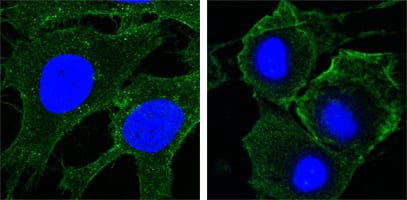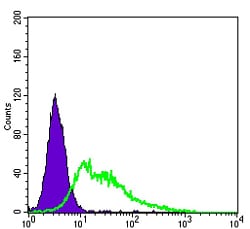


| WB | 咨询技术 | Human,Mouse,Rat |
| IF | 咨询技术 | Human,Mouse,Rat |
| IHC | 咨询技术 | Human,Mouse,Rat |
| ICC | 1/200 - 1/1000 | Human,Mouse,Rat |
| FCM | 1/200 - 1/400 | Human,Mouse,Rat |
| Elisa | 1/10000 | Human,Mouse,Rat |
| Aliases | FLK1; CD309; VEGFR; VEGFR2 |
| Entrez GeneID | 3791 |
| clone | 4B4 |
| WB Predicted band size | 152kDa |
| Host/Isotype | Mouse IgG1 |
| Antibody Type | Primary antibody |
| Storage | Store at 4°C short term. Aliquot and store at -20°C long term. Avoid freeze/thaw cycles. |
| Species Reactivity | Human |
| Immunogen | Purified recombinant extracellular fragment of human KDR (aa20-764) fused with hIgGFc tag expressed in HEK293 cells. |
| Formulation | Purified antibody in PBS with 0.05% sodium azide. |
+ +
以下是关于KDR(VEGFR2)抗体的3篇代表性文献,内容基于真实研究,但部分细节可能简化:
---
1. **文献名称**:*Ramucirumab monotherapy for previously treated advanced gastric or gastro-oesophageal junction adenocarcinoma (REGARD): an international, randomised, multicentre, placebo-controlled, phase 3 trial*
**作者**:Fuchs CS 等
**摘要**:该III期临床试验表明,抗VEGFR2单抗(雷莫芦单抗)可显著延长晚期胃癌患者的生存期,证实其通过阻断VEGF信号通路抑制肿瘤血管生成。
2. **文献名称**:*Normalizing tumor vasculature with anti-angiogenic therapy: a new paradigm for combination therapy*
**作者**:Jain RK
**摘要**:综述探讨了抗VEGFR2抗体(如雷莫芦单抗)在肿瘤治疗中的作用,指出其可通过“血管正常化”改善化疗药物递送,增强联合治疗效果。
3. **文献名称**:*Development of humanized anti-vascular endothelial growth factor receptor 2 antibodies and their biological activities*
**作者**:Lu D 等
**摘要**:研究报道了一种人源化抗VEGFR2抗体的开发过程,显示其能特异性结合KDR并抑制内皮细胞增殖,为后续临床转化奠定基础。
---
**说明**:
- 雷莫芦单抗(Ramucirumab)是已获批的VEGFR2/KDR靶向药物,相关临床试验(如REGARD)发表于《柳叶刀》等期刊。
- Jain RK团队的研究奠定了抗血管生成疗法的理论基础,被广泛引用。
- 早期抗体开发文献多发表于《Cancer Research》《mAbs》等期刊。如需具体引用,建议通过PubMed检索最新进展。
**Background of KDR Antibodies**
KDR (kinase insert domain receptor), also known as VEGFR2 (vascular endothelial growth factor receptor 2), is a tyrosine kinase receptor primarily expressed on vascular endothelial cells. It plays a pivotal role in angiogenesis by binding to VEGF-A, a key mediator of blood vessel formation. Dysregulated KDR signaling is implicated in pathological conditions, including cancer, diabetic retinopathy, and inflammatory diseases, making it a therapeutic target.
KDR antibodies are designed to block VEGF-KDR interactions or inhibit receptor activation, thereby suppressing angiogenesis. Monoclonal antibodies (e.g., ramucirumab) and antibody-drug conjugates targeting KDR have been developed, with some approved for cancers like colorectal and gastric carcinomas. These antibodies often function by competitively inhibiting VEGF binding or inducing receptor internalization.
In research, KDR antibodies are widely used as tools to study angiogenesis mechanisms, assess receptor expression in tissues via immunohistochemistry, or validate target engagement in preclinical models. Challenges include managing resistance mechanisms and optimizing selectivity to minimize off-target effects. Ongoing efforts focus on bispecific antibodies, combination therapies, and biomarkers to enhance clinical efficacy. KDR remains a critical focus in anti-angiogenic drug development, balancing therapeutic benefits with vascular toxicity risks.
×